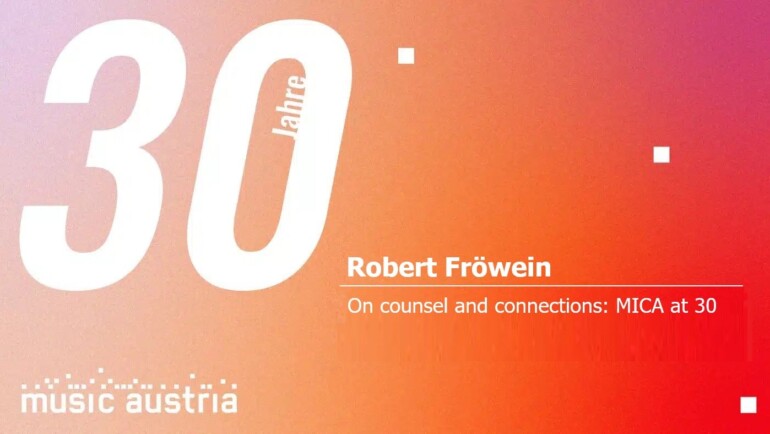
I can still hear the warning: “Trust no one over 30!” – a phrase that has had a particular sting since I’ve passed that mystic border myself. The saying comes from the 1960s, a time when a freedom-loving youth sought to distinguish itself from its more conservative elders. Five decades later, though, things have changed: 60, they say, is the new 30. And be honest: would you have guessed that Brad Pitt is 60 years old? Neither would I. After all, age is just a number…and mica – music austria is living proof.
30 years ago, the Music Information Center Austria (mica for short) was founded…and it hasn’t aged a day. On the contrary: the organization has changed with the times, without losing an essential timelessness. It helps without being overbearing; it cares without getting fussy or overprotective. Creators and promoters of music, anyone in the business, and even passionate fans who want to go pro will find advice, support, even comfort when it’s required.
expertise and Export
mica – music austria is a bastion of music devotees ready and willing to help their peers when dedication leads to distress. Free of charge and free of bias, interested parties can educate themselves on any and all aspects of the music business, learn about networking opportunities, and improve their careers. We’ve all heard horror stories about all-inclusive contracts that make a milk cow of the artist, sucking them dry of every cent – but sometimes it’s simply a mistake: “A lot of indie labels downlaod model contracts from the internet, not intending to do their artists any harm,” says mica vice-chairman Franz Hergovich. “Sometimes the contracts are unfavorable because of a lack of knowledge, or because there’s not enough money for a competent lawyer.” mica has these resources – and has developed model contracts that have set international standards. “We want to make people into responsible business partners, offer them tips on how to negotiate effectively. For a while now, record companies and management agencies have been coming to us as well – and it’s often an eye-opening experience for them.”
Photo (c) Maria Frodl

These model contracts, easily accessible online, have revolutionized the domestic music market. These days, mica staffers conduct about 1300 consultations a year – and the numbers are growing. A branch as prone to change and upheaval as the music business needs motivation and know-how in order to keep up, not least because the branch currently enjoys an international standing it hasn’t seen in a long time: Austrian music is once again a successful export commodity. “There’s an artistic and economic necessity to think internationally,” maintains Hergovich, “and it makes sense to bundle energies and resources.”
Hergovich also heads up Austrian Music Export, a joint initiative of mica – music austria and the Austrian Music Fund (Österreichischer Musikfonds). It’s not just Austria’s modest size that make international relationships and networks so important: if you want a career in music you have to think big, and international showcase concerts and tours are hugely important. And here, it’s not just about getting a gig at a high-profile festival. The most pressing issues are the most mundane: how to transport the instruments? Do I need a visa? What’s the deal with taxes and social insurance in other countries? And where can I apply for financial support to help me get ahead?
The Man with the Plan

Helge Hinteregger has been answering these questions and many more since mica’s infancy. The Carinthia native is, in a sense, the “man behind the curtain” in the domestic music business: without his help, Austrian exponents of jazz and global music might not be creating an international sensation right now. As a founding member of mica in 1994 and the man with (probably) the fattest phone book in the business, he’s seen and done everything that the wide world of sound that stretches between the Bodensee and the Neusidlersee has to offer. Even before joining mica, he had begun compiling a pan-European databank of concert promoters that still nourishes the business – and this was all before the internet; Hinteregger created this databank, open to all, with hours of telephone calls all over the continent. The communication accomplished these days by effortless e-mailing used to run his monthly phone bills up to 6000 shillings (just short of €450).
Photo (c) Werner Müller
Hinteregger is a prime example of the spirit motivating mica: he wove networks, created synergies, and was an early advocate of international knowledge sharing, now an established standard. His nerves and resources are legendary: he shepherded 80 jazz musicians to London for a festival in the pre-internet era, managed to hinder a public-drinking arrest in New York City, organized transport at a festival in Le Mans when all hope seemed lost. When the wrong DJ equipment arrived for a gig at a United Nations event, the situation was grim: “In New York, you can’t just borrow something – you need to contact a company.” But he found a solution, of course. Having the right contacts is everything.
And he didn’t lock all that knowledge away in a safe or behind a paywall; he gave it away for free. “Today, we have the opposite problem: everyone knows about everything, and everyone is so buried with emails that you can hardly get through.” He’s since gone into semi-retirement, but it’s not that easy to hang your life’s work on the nail. He organizes the two-day Kick Jazz festival at Vienna’s Porgy and Bess, and he’s always reachable if someone needs his help. For Helge, supporting musicians (and nudging them along when necessary) comes first – though, of course, “they have to walk the path themselves.”
Openness and Realism
mica’s no dream factory. It’s about providing artists and professionals with a realistic economic picture – and define borders: “It’s unlikely that people will be able to live from music alone,” Hergovich admonishes. “There’s often a lot of fear and frustration because too many people get into it without thinking about it. A lot of things in this business depend on luck…but musicians’ courage and willingness to take risks is worthy of all the support we can offer.”
In a business seemingly composed entirely of niches, quirks, and corners, an open partnership is priceless. In spite of all the upheaval of the past 30 years, questions about rights and licensing are as important as they’ve ever been. With the right advice, mica keeps musicians from signing contracts too fast – and offers free legal advice if something goes wrong. “Every now and then, there’s a case where a lot of money is involved,” says Hergovich. “One time, an Austrian band’s music was used in a Hollywood film without compensation. With our help, the band managed to negotiate a five-figure sum in the end.”
Helping people help themselves

“It’s about helping people to help themselves,” says mica managing director Sabine Reiter. “The demand has risen drastically.” In 2008 mica received about 600 requests for consultation; today that number has more than doubled. In 2008, the organization offered a single workshop; today there are about 40. The COVID pandemic led to a spike in mica’s activities – about 1600 consultations a year, about questions no one could have imagined a few months earlier: are we allowed to play live? What do I have to do differently at the concert in Munich than in Vienna? “More than anything else, workshops lead to a basic understanding of the general situation and specific issues,” continues Reiter. “We strive to remain current and offer artists a wide range of issues. We try to make things understandable. As much as possible, there should be advice and support for every question.”
Photo (c) Maria Frodl
mica also does its best to update traditional career expectations: the myth of the creative genius, working in seclusion on their magnum opus, has long been obsolete. These days, besides mastering their art, a musician has to be conversant in business, taxes, self-promotion, and copyright law. On top of that current issues in areas such as equal rights, sustainability, and artificial intelligence: it adds up to a process of constant change, a challenge that mica staffers strive to meet with openness and continual further education.
A steady ship on stormy seas
All in all, we can say with confidence: this is an organization over 30 that you can trust – implicitly. mica – music austria offers easily accessible support to music professionals, from the first steps to the crowning success. It encourages discourse and goes far beyond simply providing information. Without mica, the Austrian music business wouldn’t only be less fair and less safe: it would be far less lively and successful. Whether you’re wondering how to calculate licensing fees or you just need a little encouragement from someone with experience: here, you’re guaranteed to find help.
Arts and culture – particularly music – help anchor an open society, and mica is a ship that sails, calm and steady, through stormy seas. The ship is powered by passion, knowledge, and underlying motivation that will support music professionals and artists for the next three decades and beyond. Together, we make a difference.
Robert Fröwein is a journalist, author, and music editor for the Kronen Zeitung.
Translated and adapted from the German original by Philip Yaeger.
